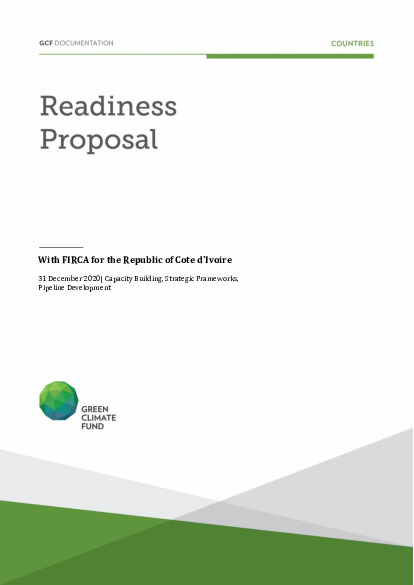Strengthening Côte d’Ivoire’s Capacity and Ownership to Access Climate Finance for GCF Country Programme Implementation

Strengthening Côte d’Ivoire’s Capacity and Ownership to Access Climate Finance for GCF Country Programme Implementation
For the past two years, Côte d’Ivoire (CIV) has initiated a strong engagement with the GCF. Four multi-country projects (FP151, FP152, FP095 and FP092) have been approved by the GCF covering CIV, as well as a Simplified Approval Process grant for REDD+ (SAP015). The country has also got approved three readiness projects including a NAP proposal. However, many challenges remained and have been highlighted by the implementation of the first readiness project.
A NDC Partnership Plan and a Country Programme have been prepared but not yet validated/implemented; a no-objection procedure has been defined, but not yet tested or operationalized; the NDA Focal Point (NDA FP) has been nominated but does not have a strong team to engage with the GCF on a regular basis, and the NDA has not been formalized; the country’s stakeholders are not yet in a position to prepare readiness proposals or CNs by themselves, they need technical assistance from the GCF at this point. Also, no single national project has been approved so far, and national entities are yet to be accredited. The country has started the process to become a member of the Coalition of Finance Ministers for Climate Action and needs to design and implement an action plan under Helsinki’s six principles. For this purpose, a national climate finance platform (NCFP) was set up and needs to be strengthened to coordinate climate finance access at national level.
Building on the achievements of the previous readiness projects, the ultimate goal of this readiness grant is to strengthen Côte d’Ivoire’s capacities and ownership to access climate finance for Country Programme implementation. In order to reach this goal, the grant has two main objectives: i) develop strong ownership and capacity of the GCF modalities by the country’s stakeholders so that they can efficiently engage with the GCF by themselves, through further improving the institutional framework, training the stakeholders in designing proposals, staffing up the NDA team, facilitating the “fast track” accreditation of FIRCA, etc. ; ii) prepare a pipeline of quality projects through the design of at least 2 CNs, 1 PPFs, and a multiyear readiness proposal, through a learning-by-doing approach. The first objective will be mainly achieved through the following outcomes: a) country FP is operational and effective, b) DAEs have established capacity, and c) relevant stakeholders have established adequate capacity and systems. The second objective aforementioned will be achieved mainly through the following outcomes: d) the country has developed or enhanced strategic frameworks; e) an increase in the number and quality of project CNs submitted; and f) an increase in the number of PPF grants and funding proposals approved.
The readiness will help operationalize NDA FP by testing the NOP on two CNs to be designed. The NOP will be tested with the NCFP acting as national coordinating body of climate finance. The NDA FP role and responsibilities will then be clarified to enable a better engagement with NCFP.
The country ownership will be pursued through a readiness needs assessment that will provide some visibility for the programming of readiness proposals in the next 3 years. The NDA will also be fully capable of preparing readiness proposals itself while developing a strong MRV system to track climate finance flows and supporting the implementation of the country programme through efficient communication.
The main beneficiaries of this grant are the NDA FP’s team, but also some specific groups such as critical policy makers, specialized journalists, the FIRCA, and the ministries which will contribute to the design of the projects CNs and PPF.